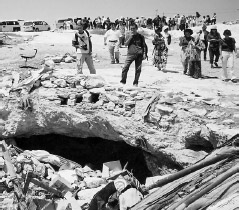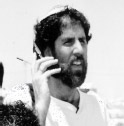
|
||||
|
|
SUMMER, 2002: Volume 7, Issue 2 Peace Teams Confront Middle East Violence
Some time ago, Mustafa Barghouthi, President of the Palestinian Medical Relief Committees and Director of the Health, Development, Information and Policy Institute (HDIP) in Ramallah, said: "Palestinians have been asking for an international protection force to monitor events in the region for months. The US has twice vetoed a United Nations resolution asking for this. . . [M]onths ago, Palestinians began their own grassroots movement of international protection. Since then, delegations from a number of European countries, as well as Canada and the United States, have witnessed to and monitored the situation on the ground reporting the reality to their home countries." This urgent need for accompaniment, protection, and, above all, witness (in all its forms) is the primary impetus behind the rapidly growing numbers of peace teams and delegations of peace and solidarity groups in the West Bank. Christian Peacemaker Teams (CPT), a partner organization of Friends Peace Teams, has had a continuing presence quartered in Hebron and has been active throughout the West Bank since the mid-90�s. CPT permanent team members and delegations not only engage in accompaniment and observation activities, but often do nonviolent direct action and public witness on behalf of Palestinians experiencing oppression.
Most Friends are familiar with CPT�s purposes and activities. However, Friends may not know of the other American organizations which send peace delegations to the region, and, even more important, of the indigenous Israeli and Palestinian peace and justice groups working with each other and with the foreign nationals. Ann Hardt, member of Pima Monthly Meeting in Tucson, Arizona, joined an interfaith delegation last year sponsored by the Fellowship of Reconciliation (FOR) and co-sponsored on the ground in Palestine by the Center for Rapprochement Between Peoples (a Palestinian peace group) and the Israeli Committee Against Home Demolitions. Ann says that FOR sends several delegations a year (as does CPT) and that a recent FOR group joined CPT and members of the International Solidarity Movement in worship in front of the Church of the Nativity. Ann reports that her group was primarily charged with listening and learning from the local peace and justice groups and participating with them when called to do so. In addition to FOR, several American Churches�United Methodist, Episcopalian and Lutheran, among others�also send information gathering delegations. The International Solidarity Movement (ISM) is less a peace team than a nonviolent, direct action resistance-against-the-occupation movement. It is led by Palestinians, and internationals are invited to join. Huwaida Arraf, a young Palestinian- American woman who is one of the founders, states that recognition of "the importance of having internationals join Palestinians in nonviolent resistance (marches, protests, etc.) led to the establishment of ISM towards the beginning of this latest Intifada." The movement was launched with ISM�s first campaign in August 2001. We (the Durlands) were asked to provide advice and direction about nonviolence training and orientation for the movement�s international participants while we were in Palestine with a CPT delegation just prior to the ISM�s August campaign�a good indication of how closely various groupsvwork with each other.
In a recent e-mail, Huwaida told of ISM�s excursion to Jericho after being repeatedly refused entry into Ramallah during the reinvasion of that city: "[We] resolved to drive east, down into the Jordan Valley, and try to visit the Christian communities of Jericho. Jericho, as you may or may not know. . . has been under total closure for many months. Indeed, the town was sealed shut months ago when a deep trench was dug by Israeli armored bulldozers around most of the town. The main entrance is through a fortified Israeli checkpoint, which has been placed on the southern approach road." Huwaida�s account goes on to describe how the group met with and learned from Christian leaders and schoolteachers in Jericho and were able to distribute the food they had been unable to share in Ramallah. ISM, CPT, FOR and several Israeli peace groups have tried repeatedly over the weeks of the siege of the Church of the Nativity to bring food to those trapped inside, but in most cases have only been able to pray outside, prevented by the Israeli Army from any contact with those inside. The Israeli Peace Activists, in many ways, are the true heroes in this crisis since for Israeli citizens to stand and act in public opposition to their government�s policies of repression and destruction in the Occupied Territories requires tremendous courage. Ordinary Israeli citizens work with Rabbis for Human Rights (RHR), the Israeli Committee Against Home Demolitions (ICHD), Tikkun, and Gush Shalom, as well as joining with ISM activities. An Israeli peace activist, Neta Golan, was among those who voluntarily imprisoned herself in Yassir Arafat�s Ramallah compound for the entire month of that blockade. ICHD members have often been the ones willing to lie down in front of bulldozers, in some cases successfully preventing the demolition of Palestinian homes. Peace teams, peace delegations, and solidarity groups, both international and local, have not been able to prevent the atrocities of recent weeks. This is not to say, however, that they are ineffective. The presence of internationals and Israelis, who courageously oppose the occupation, surely has immeasurable value in terms of possibly lessening the violence and curtailing or preventing individual acts of brutality. Perhaps even more important is their role in telling the world the truth. When the media are focused on the terrible damage done by Palestinian bombers, it is important that CPT and other international groups tell of the other side of the conflict in human terms. Mary Hughes-Thompson, who was a member of a recent CPT emergency delegation (April 15-29, 2002), wrote upon her return: In Hebron young children dress[ed] each morning for school, then fearfully walked up to tanks and soldiers to ask if they would be allowed to continue. Settlement children waited to throw rocks at these brave little students who were never allowed to retaliate. Today I read that several schools in Hebron have been occupied by soldiers. My heart breaks as I recall the kindness we received from these gentle people, the smiles and the thanks that greeted us, the words of hope they expressed that we might let the world know of their suffering and despair. |
|||

